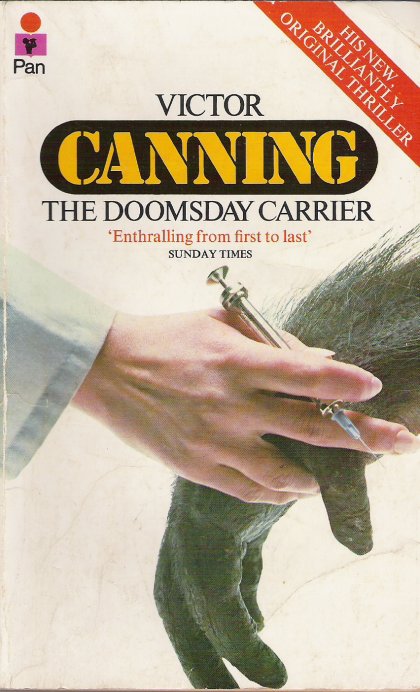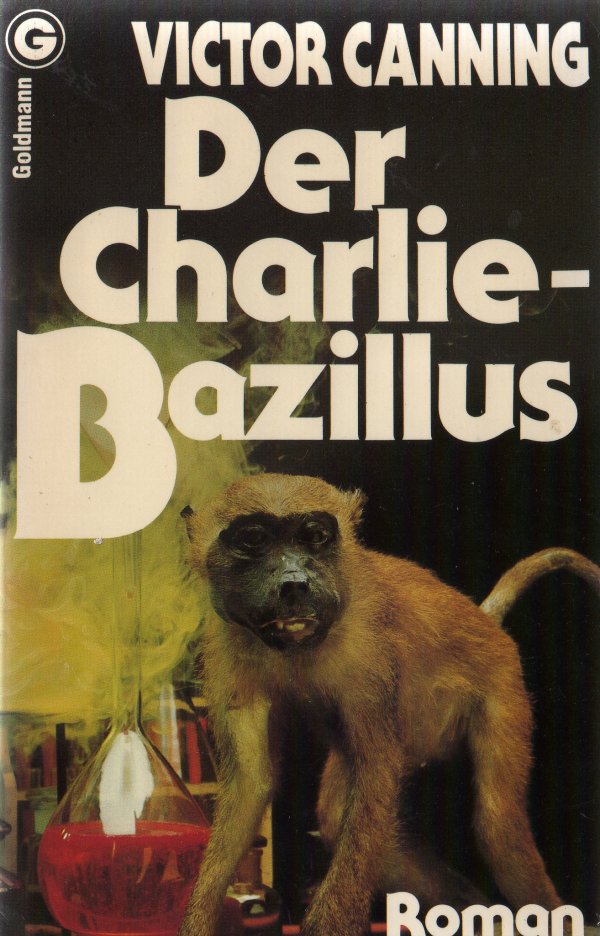
First edition

Pan paperback

German translation

Birdcage Companion
 First edition |
 Pan paperback |
 German translation |
 Birdcage Companion |
||
The BookJean Blackwell, engaged to George Freemantle, drops into his flat and sees him in flagrante with another woman. Deeply upset, she returns to her work at Fadledean, a biological warfare research station. She takes over supervision of Charlie, a chimpanzee, but falls down in a faint, so letting Charlie escape. Unfortunately Charlie has just been inoculated with a plague bacillus and, unless recaptured, will become highly infectious in about 21 days. We follow the hunt for Charlie from three points of view: Firstly Charlie himself, and various people he comes across on his journey, a boy fishing, an old man swimming, a commercial traveller, a gamekeeper, railway gangers. Secondly from the view of Captain Stevens, the helicopter pilot who has drawn Day Fourteen in the mess sweepstake and is in no hurry to recapture the chimp. Third from the view of Jean Blackwell and John Rimster, an official sent down from London to take charge of the hunt. Rimster actually works for Grandison and the 'Birdcage' or 'dirty tricks' branch of the foreign office, but is about to be fired because of an alcohol problem. There are echoes of Canning's pre-war pastoral picaresque books in Charlie's travels and encounters, especially of Mr Finchley discovers his England of 1934. There is also an indignant political message in the final paragraph: But since one swallow does not make a summer, the successful plague-carrying test on Charlie had to be confirmed and reconfirmed to make it safe for men and women to be used as carriers, so another chimpanzee took his place. Everyone was happy, particularly the apes in dark suits who might one day for political or military reasons decide to use the silent weapon of plague to avoid the open and honest brutality of the sword. The book has one particularly memorable line (at the start of the last chapter) which tells us something about Canning's approach to his work: Tragedy and comedy sometimes share the same bed. Both are restless sleepers. |
Publishing HistoryPublished by Heinemann in 1976 at £3.50. The US edition was by Morrow in the same year. There was a serialisation in Woman's Own in October 1976. There was a Pan paperback in 1978. Unmade movie: Summertime for CharlieFilmscript by John Peacock This script was among papers lodged by Adria Canning (Canning’s third wife) in 1986 with the American Heritage Center of the University of Wyoming. John Peacock was active as a scriptwriter for British television from the early 1970s to the mid-1980s. I have no idea at what stage he was invited to write this script or why it did not go any further, though clearly it would have been very difficult and expensive to film at that time, given the amount of animal training needed to secure the behaviours described. It would also have involved some cruelty, since the chimpanzee has to be visibly ill some of the time. Nowadays, no doubt, much could be achieved with computer-generated imagery. The plot and characters of the book are largely preserved intact, with one prominent addition, the scientist colleague Boysey. We still have Jean Blackwell, George Fremantle, John Rimster, Dr. Armstrong, Captain Stevens the helicopter pilot, the boy Andrew Garvie, and back in his Whitehall headquarters Sir Manfred Grandison (though we are not told his first name in this book or script). Larger changes occur towards the end of the story. In the book the eccentric wildlife campaigner Lady Cynthia Chickley tries to use Charlie for publicity, unaware of the danger he represents. In the filmscript she is replaced by timid old Ivy, living in a condemned property among her cats. In the book Charlie survives while John Rimster, the alcoholic government agent, falls to his death from a tower when he tries to fire an anaesthetic dart at Charlie. In the script it is Rimster who survives after killing Charlie with a real bullet. He has a replacement chimp on hand to fool the public. |